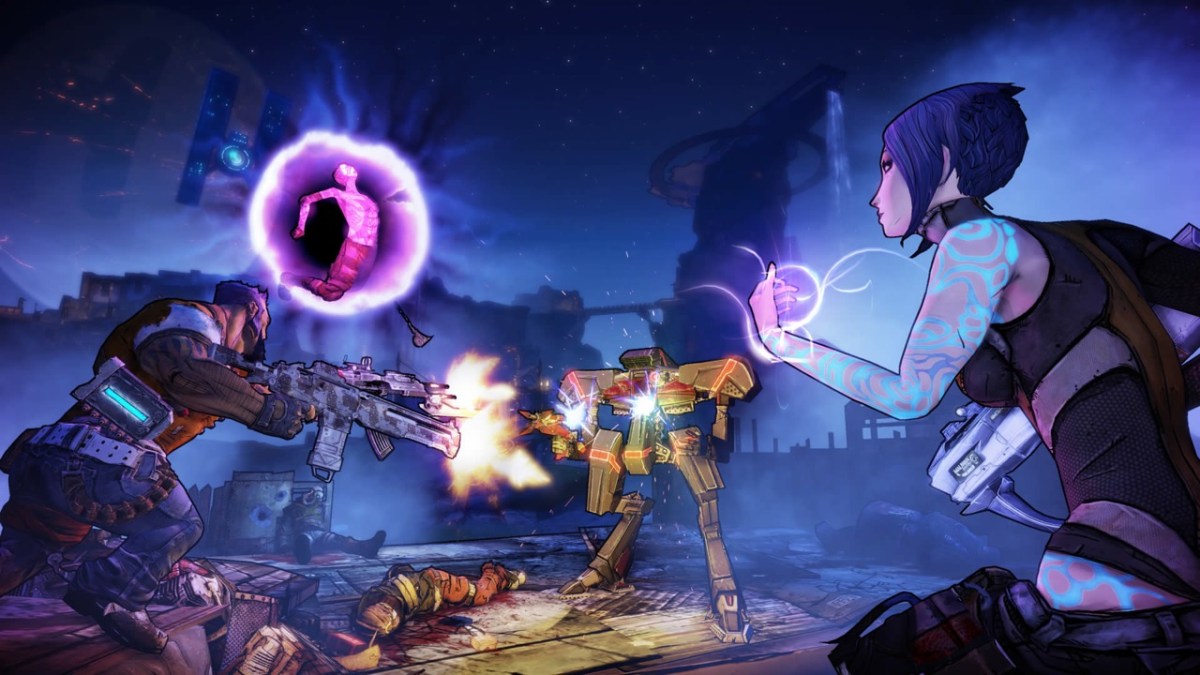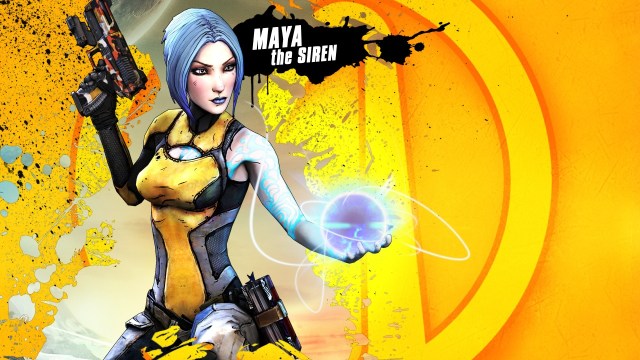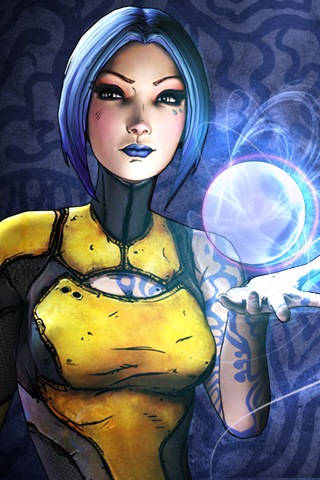If you had once told me that I would one day discover my sexuality by playing a first person shooter, I would have laughed in your face.
I mean, it’s just a ridiculous concept. For one thing, I hated FPS games, and besides that, I was straight … wasn’t I?
I got into the Borderlands franchise on a whim. One of my favorite musicians had been hired to create a remix video promoting the newest title in the series, and as was the case with the vast majority of his creations, I immediately fell in love. But instead of it becoming the incessant background noise to my every activity, I found myself drawn to the video itself, and in particular, the world it presented.
The art style, the chaos, and the sheer absurdity of it all—it was completely and utterly over the top—but there was something about it that piqued my curiosity. It’s difficult to describe, but it made me feel like a kid again, particularly as I reminisced about all those hours spent immersed in different worlds. The older I got, the further I had distanced myself from my self-perceived “childlike” hobbies, but I hadn’t realized how much I missed that escape. It made me want to explore all over again.
And while its ridiculousness was what drew me in, the unexpected complexity and depth of its world were what kept me playing. I came for the explosions and absurd humor, but stayed for the unique characterization and surprisingly intricate world-building. The games’ refreshing attitudes to representation and inclusivity were also impossible to ignore—a welcome change from the action-packed titles of my youth that never seemed able to fathom the fact that someone other than a heterosexual white male could possibly be playing them.
So, like any fan-girl with a new obsession, I began tirelessly consuming every bit of information I could find on the series. Borderlands had inspired a great deal of thought-provoking articles, interviews and opinion pieces, including many that explored its unusually diverse approach to character representation (The Mary Sue’s own interview with the lead writers of The Pre Sequel is a great example of this). But as well as outside sources, the games’ creative team also had a refreshingly open relationship with their fans, which led to a veritable wealth of information including detailed blogs documenting the games’ development, as well as in-character AMAs and social media feeds (both of which are considered canon to the games’ universe). On top of this, BL2 and TPS lead writer Anthony Burch also maintained an (unfortunately now defunct) ask.fm account where he answered every question imaginable, which was where I first became aware of Burch’s head-canon of Maya being asexual.
I had always been a fan of Borderlands 2’s, Maya, the playable siren that in a lot of ways was the direct inversion of the first game’s equivalent, Lilith. While Lilith was fiery and impulsive, there was a subtle stoicism to Maya, a level of poise and control that occasionally faltered to reveal a young woman desperately trying to figure out her place in the universe. She was both endearing and engaging, despite the limitations that came with being a predominantly silent protagonist (an issue that was thankfully rectified with great success in The Pre Sequel).
Despite her limited chances for characterization, Maya’s character was further fleshed out during the second game’s many DLC’s where Burch began leaving canon hints about her asexuality (and potential aromanticism). For example, in Mad Moxxi and the Wedding Day Massacre, when asked to provide words of romantic encouragement to a robot with poor self-esteem (hey, I told you it was a weird game), Maya responds, “I know almost nothing about romance, so please pretend I just said something really inspiring about the power of love.” Similarly, in Sir Hammerlock vs. the Son of Crawmerax, when reading a letter from her assassin-killer that laments her ‘confusingly repulsive’ physical attractiveness (seemingly from the delightfully deranged scientist Patricia Tannis), instead of questioning the bizarre method behind her assassin’s death (it involved beer and a straw made of anthrax), Maya’s only utterance is, “Huh. I’m attractive?”
As is the case with the vast majority of the franchise’s instances of representation (yes, even the much-maligned Janey Springs whom I will fiercely defend to the death), I found these instances to have nothing to do with so-called ‘agenda pushing’ or ‘tokenism’, and instead considered them to add to the intricacies of Maya’s characterization. It’s strange, yet wonderful, that in such an over-the-top and cartoonish world that the characters that inhabit it are surprisingly human. While prior to this I had enjoyed Maya’s character, these were the first instances where I actively related to her (albeit in ways that I had yet to firmly grasp).
Even before I considered myself as anything other than straight I appreciated Borderlands’ representation from a purely narrative perspective. Not only did it offer interesting complexities to its characters, but it also played into the world building of the games’ universe, ultimately providing a source of bleak, yet sardonic humor. There’s always been something so darkly hilarious about what is arguably an insidiously immoral place filled with nothing but death, despair, and destruction being infinitely more progressive than our own world. Similarly, the fact that the game censors a lot of its swearing (or uses words such as freakin’ etc.) also helps to illuminate the overall absurdity and hypocrisy of a game that sees the player unjustly slaughtering thousands.
Of course, things become less funny when you realize that marginalized groups playing the game could potentially feel safer on a ruthless, dog-eat-dog planet like Pandora; where morality pretty much doesn’t exist and violent anarchy reigns, than they do in their real life. Which only goes to demonstrate the importance of diversity and representation in all forms of media. In fact, this importance is something I can attest to; after all, without it I wouldn’t be writing this now. Instead, I’d be continuing on in my life feeling broken, lost and alone…
Now, I know what you’re thinking:
“How could a person possibly not know their sexuality until they were (by all accounts) a grown-ass adult?”
The answer is somewhat complicated …
More than anything else, I thought that my lack of sexual attraction was a symptom of a chronic illness that I had experienced since puberty that led me to perceive myself as nothing more than damaged goods. I truly believed that I was so broken by my medical condition that I was merely depriving myself of one of the most ‘fundamental facets of the human experience’ (or so I was led to believe). On top of this, I also made the mistake of letting other peoples’ perceptions of me dictate my orientation, ultimately misinterpreting sexualization for sexuality.
I also had a firm (yet ultimately incorrect) image of what an asexual person was, and knew that it didn’t fit me, which when combined with the fact that I wholeheartedly knew I wasn’t gay led me to believe that I was heterosexual by default. Yet all that changed when I was perusing Anthony Burch’s ask.fm and stumbled upon a series of conversations regarding Maya’s asexuality. During this time Burch expressed concern that the character was not visually designed with her asexuality in mind, which he said was obvious by the fact that her outfit featured a lot of exposed skin and she wore heavy makeup. At the time this seemed like a fair point to me, however, after it was posted a number of asexuals contacted Burch and pointed out that how a person presents themselves (via their outfits or through makeup etc.) has absolutely no bearing on their sexuality (or lack thereof).
As one anonymous respondent put it, “I think Maya can still be asexual with the way she dresses! Sexuality is irrelevant to the way you present yourself, and people don’t always dress for others (me, for example, I’m an asexual who shows off my bod)”.
I’m slightly embarrassed to admit it now, but that was news to me. The thought of an asexual dressing ‘sexily’ seemed like an oxymoronic concept to me. Previously I had envisaged them as being so utterly against the concept of sex that they would do everything in their power to avoid being sexualized. And as someone whose sartorial choices were (and still are) often referred to as ‘dominatrix-chic’ I had always assumed that I didn’t fit the mold. It wasn’t until I read these responses that I realized how skewed my perception had been, and thinking back to that odd tug of familiarity and recognition in Maya’s DLC conversations, I couldn’t help but wonder if I there was another reason why I related to her so much.
I immediately hit the web, putting my obsessive fan-girl skills once again to use by finding out everything I could on the topic. I was amazed by how straightforward it all was; asexuality simply meant that a person did not feel sexual attraction. On top of this, I was introduced to aromanticism which was an entirely new concept that fit me like a glove—while I could still potentially chalk up my lack of sexual attraction to my health problems, there was no explaining away my lack of romantic attraction—it was just who I was. It was without a doubt one of the most enlightening experiences of my life, and as I read through story after story that could have all been written by me, I felt a weight lifting off my shoulders. I had been wrong—I wasn’t broken—I was just asexual. It quite honestly changed my life.
And I had a freakin’ FPS to thank for it…
Overall, I think the discovery of my asexuality is a fitting tribute to the game that inspired it; after all, both are categorized by a level of absurdity that belies the true depth and significance they both encapsulate. To a lot of people Borderlands, is just an over-the-top piece of entertainment, but to others (like myself) it’s so much more than that. Much like the eponymous floating city that serves as a safe space for the Vault Hunters on Pandora, Borderlands itself is a sanctuary—a place amidst the chaos and confusion where diverse groups can seek refuge from the harsh realities of their day-to-day lives.
And like a lot of players, I am eternally grateful for this, but unfortunately we’re now left with a problem …
The game’s biggest champion for diversity and representation, Anthony Burch, has left Gearbox to pursue other endeavors, leaving a large number of marginalized gamers concerned about the future of the franchise. In particular, some asexuals are terrified that a new writer will whitewash Maya’s asexuality. Now, besides me being hired as a writer (seriously, Gearbox, I’d be prepared to do impossibly brutal things that would make Pandorans blush and Hyperion workers high-five me—hell, even Handsome Jack himself would be shocked by my moral ambiguity), the only thing we can do is hope that the BL3 team know just how important representation is to the community, as well as how much depth it can add to the characters they create.
So, if inclusivity in gaming matters to you (or you just like well-written and entertaining games) I wholeheartedly recommend checking out the Borderlands series if you haven’t already. On top of that, if you’d like to see even more diversity in Borderlands 3, why don’t you get in touch with Gearbox via their Facebook or Twitter and tell them what types of representation you’d like to see. With a bit of luck, and the support of a passionate fan base, BL3 could prove to be most diverse (and by association most interesting) adventure yet!
Nico is an aromantic asexual from Australia. After spending her early 20s as a fashion and lifestyle writer, she’s shirked her glossy persona and given in to her true geek self. She blogs about both the discovery and acceptance of her aro/ace identity at (A)Sex And The City. You can also find her on Twitter @asexandthecity. She was deadly serious about working on BL3, so to any Gearbox employees, you know where to find her. Subtlety is also clearly her strong point …
—Please make note of The Mary Sue’s general comment policy.—
Do you follow The Mary Sue on Twitter, Facebook, Tumblr, Pinterest, & Google +?










